

En Inde, les descendants des maharadjas n’ont plus de statut spécial depuis 1971, mais ils conservent le prestige anciennement attribué à leur famille. Certains ont aussi encore à leur disposition une fortune importante et sont propriétaires de palais souvent difficiles à entretenir. Le Prince Manvendra Singh Gohil, héritier du royaume de Rajpipla dans le Gujarat, est le premier membre d’une famille royale dans le monde à avoir déclaré son homosexualité. Il utilise ses relations, son nom et son héritage pour agir pour une cause souvent oubliée en Inde, la prévention du sida parmi les populations homosexuelles et transgenres. Il est aujourd’hui marié à un citoyen américain selon le régime américain (ndlr : le mariage entre deux personnes du même sexe n’est pas reconnu en Inde) et vit entre sa résidence de Juhu à Bombay et son palais de Rajpipla dans le Gujarat.
Depuis sa résidence de Mumbai, le Prince a répondu à nos questions (For English, scroll down).
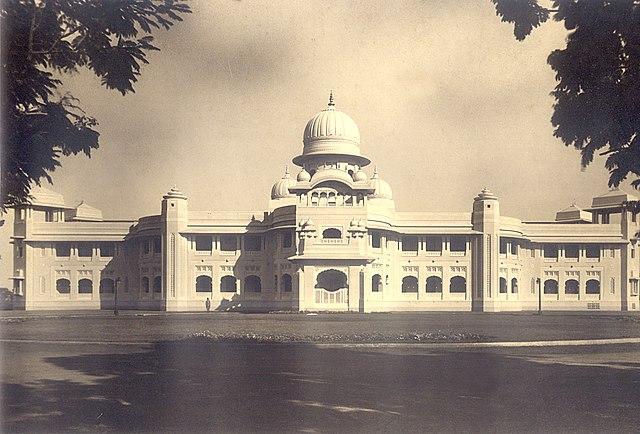
lepetitjournal.com Bombay : Bonjour Prince Manvendra Singh Gohil, tout d’abord, nous vous remercions d’avoir accepté notre interview. Pourriez-vous nous décrire votre enfance, la découverte de votre homosexualité et les étapes de votre “coming out” ?
Prince Manvendra Singh Gohil : Je suis le fils héritier du Maharadja de Rajpipla, un royaume vieux de plus de 650 ans dans le Gujarat. Comme je l’explique lors d’un TedX Talk dans une école à Amritsar, je suis né avec une cuillère en argent dans la bouche et j'ai passé mon enfance dans une grande maison à Mumbai dans laquelle travaillaient 22 domestiques. J’ai été élevé dans un cadre ultra protégé par une “nanny”, avec des règles strictes et un protocole à respecter, je ne voyais mes parents que très rarement. C’est une enfance très différente, coupée du monde extérieur et sans interaction sociale.
J’ai commencé à découvrir mon homosexualité vers 14-15 ans, mais je ne connaissais pas les mots pour décrire mes sentiments. A 25 ans, j’ai été marié à une Princesse par mes parents, ce fut un désastre et cela s’est terminé par un divorce un an après.
Après la rencontre avec le premier activiste homosexuel indien, Ashok Row Kavi, j’ai pris conscience de ma sexualité. Je me suis lancé dans des actions auprès de la communauté homosexuelle en Inde ce qui m’a permis de côtoyer de nombreux homosexuels et de m’accepter en tant que tel sans toutefois me déclarer ouvertement à mes parents. En 2000, j’ai fondé l’association Lakshya Trust dans le Gujarat pour faire de la prévention et augmenter la prise de conscience des risques du sida.
Mais, en 2002, je suis hospitalisé pour dépression et mon psychiatre explique à mes parents que je suis homosexuel. Cela leur paraît inconcevable et ils me confinent dans le palais de Rajpipla. Pour eux, un héritier du trône a un rôle de modèle à tenir auprès de la population locale et il ne peut pas être homosexuel. Mes parents ont essayé toutes sortes de techniques et méthodes pour me “soigner” ce que l’on appelle la thérapie pour la conversion et qui est encore pratiquée dans nombre de familles. Cela va de la prière à la torture... J’ai accepté toutes leurs tentatives pour me faire changer, j’ai même subi des électrochocs, cela me paraissait le seul moyen pour qu’ils finissent par se rendre à l'évidence.
Finalement, en 2006, je fais mon “coming out” en acceptant l’interview d’un journaliste local. L’article fit scandale, mais j'étais convaincu que j’avais fait ce qu'il fallait.
Tout a changé lorsque j’ai été invité sur le plateau d’Oprah Winfrey en tant que prince homosexuel. Cette interview a eu d’importantes retombées positives et m’a permis de vivre pleinement et de continuer à développer mes actions pour la prévention du sida et la protection des populations homosexuelles en Inde. Cela a changé l'état d’esprit de nombreuses personnes envers moi et notamment mes parents. J'étais enfin reconnu comme moi-même !

Pouvez-vous nous en dire plus sur votre association et sur les actions que vous avez menées ?
L’objectif de Lakshya Trust est la prévention des risques liés au sida parmi les hommes ayant des rapports sexuels avec des hommes et d’offrir aux personnes malades une information adéquate sur les possibilités de traitement et une protection. L’Inde est le troisième pays comptant le plus de malades du sida dans le monde, même si on en parle peu. Selon les chiffres du gouvernement, il y aurait 2,5 millions de personnes séropositives dans le pays, mais ce nombre est surement largement sous-estimé car il n’y a pas de dépistage systématique.
La fondation a reçu l’aval du gouvernement dès sa création pour agir auprès de la communauté homosexuelle alors que l’homosexualité était encore considérée comme un crime (ndlr : l’homosexualité a été décriminalisée suite à la décision de la Cour Suprême d’abroger l’article 377 de la Constitution en décembre 2018).
Un des succès de Lakshya Trust a été l’adoption par le gouvernement indien de la loi sur les droits des personnes séropositives en 2017 qui interdit les discriminations sur le lieu de travail et dans les hôpitaux en particulier. Le gouvernement introduit aussi l’utilisation des méthodes de tests rapides ce qui permet aujourd’hui d’identifier les malades plus vite et à plus grande échelle. De plus, il est désormais possible d'organiser des camps de dépistage afin de pouvoir évaluer l’ampleur de la maladie dans le pays. Il y a encore en Inde de nombreux stigmates attachés au sida et les personnes potentiellement infectées hésitent à pratiquer le test. C’est pourquoi, nous avons lancé de nombreuses campagnes de prise de conscience des risques de contamination et des possibilités de traitement.
Lakshya Trust agit pour la promotion de l’utilisation des préservatifs qui sont encore mal considérés en Inde et qui sont un des moyens de prévenir la contamination par le sida. Les gens hésitent à aller acheter des préservatifs, c’est pourquoi nous avons lancé des campagnes de distribution gratuite de préservatifs dans plusieurs villes. Avec l’aide de AIDS Healthcare Foundation, nous avons démarré un site en ligne de dons de préservatifs qui sont acheminés par des coursiers, pour l’instant, uniquement à Delhi. L’objectif est de mettre les préservatifs à la disposition de tous dans les lieux publics comme c’est le cas en Europe ou en Amérique où on peut les acheter dans des distributeurs dans les toilettes publiques.
Grâce à nos actions, aujourd’hui, les personnes séropositives ont accès à un traitement dès la découverte de leur maladie alors qu’auparavant, les médecins attendaient que le patient soit à un certain stade de la maladie pour commencer à prescrire des médicaments. C’est un grand pas pour limiter la propagation du virus
Lakshya Trust a été fondée dans le Gujarat et son rayon d’intervention est dans cet État. Cependant, nous sommes en lien avec d’autres associations un peu partout en Inde afin de toucher toute la population du pays. Il existe en Inde un réseau pour l'égalité des minorités sexuelles dans tous les domaines de la vie, sans discrimination : INFOSEM, dont je suis membre. Au travers de ce réseau, nous pouvons aider une personne où qu’elle soit en Inde.
De plus, je suis l’ambassadeur en Inde de AIDS Healthcare Foundation, la plus grande et la plus ancienne organisation au monde de dépistage et de traitement du sida.
Vous avez mentionné le réseau INFOSEM pour l'égalité des minorités sexuelles en Inde. Les Hijras sont une de ces minorités sexuelles dont on parle souvent et que l’on peut voir mendier dans les rues de Bombay. Pouvez-vous nous en dire plus sur cette communauté que vous aidez aussi ?
La communauté Hijra vit dans les pays du sous-continent indien : Inde, Pakistan, Népal et Bangladesh et existe depuis plusieurs siècles. Ce sont des transgenres différents qui ne font pas partie de la société et vivent entre eux dans leurs familles selon une structure sociale propre. Ils vivent traditionnellement de la mendicité, mais aussi animent les divertissements dans les mariages (chants, danses et pièces dramatiques) et travaillent souvent dans la prostitution.
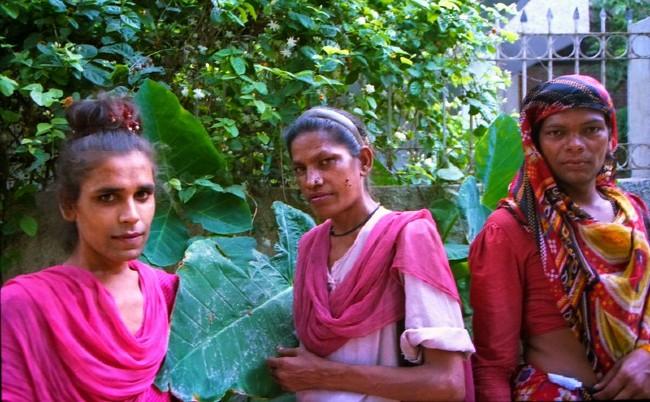
Les Hijras étaient connus pour être des soldats brillants faisant partie de l'armée moghole, et assuraient aussi la sécurité de la cour royale. Avant la colonisation britannique, ils étaient extrêmement respectés et accordaient leurs bénédictions lors des mariages et des naissances.
Les Hijras vénèrent la déesse Bahuchara Mata, qui selon des légendes hindoues se serait coupée les seins pour échapper à un viol ou aurait castré son mari qui la trompait avec un homme. Le temple principal de Bahuchara Mata se situe dans le Gujarat, près d’Ahmedabad, les Hijras de toutes les régions du sous-continent se rendent dans ce temple pour prier Bahuchara Mata. C’est aussi la déesse du célibat.
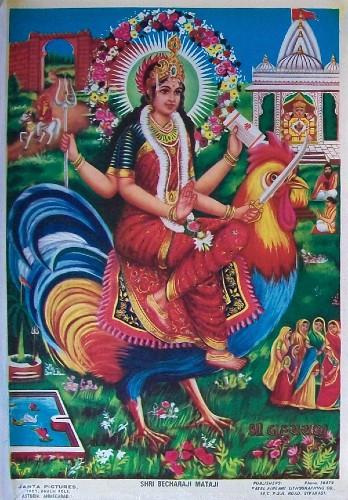
La position des Hijras dans la société a été profondément modifiée par la colonisation britannique, les Anglais craignant leurs capacités guerrières. Suite au mouvement de rébellion contre l’empire britannique en 1857, la reine Victoria aurait demandé aux administrateurs des colonies indiennes d’identifier les populations qui étaient contre son empire et les Hijras et les prostituées furent nommés. C’est pour contrer la puissance de ces deux communautés que les colons ont rédigé ce qui fut l’article 377 de la Constitution indienne (ndlr : aboli en décembre 2018 par la Cour Suprême) qui faisait de l’acte sexuel non pratiqué en vue de la reproduction un crime. Cette loi, en fait, visait les homosexuels mais aussi toutes personnes ayant une relation sexuelle sans l’objectif de procréer. Comme de nombreuses autres lois, celle-ci fut intégrée dans la constitution indienne après la proclamation de l'indépendance même si, par essence, elle était opposée à plusieurs autres articles de ce même document.
A partir de cette période, les Hijras perdent leur statut, sont discriminés et leur condition sociale se détériore.
Depuis peu, les Hijras bénéficient de la protection de leurs droits en matière de logement, éducation et santé ainsi que les autres membres de la communauté transgenre selon la loi de protection des droits des personnes transgenres votée en 2019 (Transgender Persons [Protection of Rights] Bill, 2019) après plusieurs tentatives depuis la reconnaissance des droits des transgenres en 2014 par la Cour Suprême. Je pense que l’Inde est le premier pays au monde à avoir reconnu les droits des transgenres. La loi identifie trois catégories de transgenres : les transexuelles, les transexuels et les Hijras. Cependant, la loi actuelle ne satisfait pas pleinement les membres de la communauté transgenre car elle ne leur permet pas de choisir librement leur identité alors que c'était le cas dans le jugement de la Cour Suprême de 2014.
Mais, c'est encore une communauté défavorisée en marge de la société contemporaine.
En 2019, deux candidats de la communauté Hijra se sont présentés aux élections de la chambre basse du parlement indien : ELECTIONS 2019 - 2 candidats transgenres à Bombay
Un message pour les lecteurs ?
Quelle que soit notre nationalité, notre genre ou notre lieu de résidence, il est important de se renseigner sur les sujets que l’on ne connaît pas afin de former une opinion claire. Par exemple, en 2019, personne ne connaissait ou presque le coronavirus, aujourd’hui, tout le monde est au courant des mesures de prévention et des risques. On doit faire de même pour le sida et ne pas avoir d’avis avant de s'être informé sur la maladie. C’est l’objectif de la fondation Lakshya Trust : diffuser des informations précises et objectives sur le sida.
“Mettez-vous à la place d’une personne et essayez de comprendre ses problèmes. C’est le meilleur moyen.”
***

English version
In India, descendants of the Maharajas no longer have special status since 1971, but they retain the prestige formerly attributed to their families. Some also still have significant wealth at their disposal and are owners of palaces that are often difficult to maintain. Prince Manvendra Singh Gohil, heir to the kingdom of Rajpipla in Gujarat, is the first member of a royal family in the world to declare his homosexuality. He uses his connections, name and heritage to take action for an often forgotten cause in India, the prevention of AIDS among gay and transgender populations. He is now married to an American citizen under the American law (note: marriage between two people of the same sex is not recognized in India) and lives between his residence in Juhu in Bombay and his palace in Rajpipla in Gujarat.
From Juhu, Prince Manvendra Singh Gohil answered our questions.
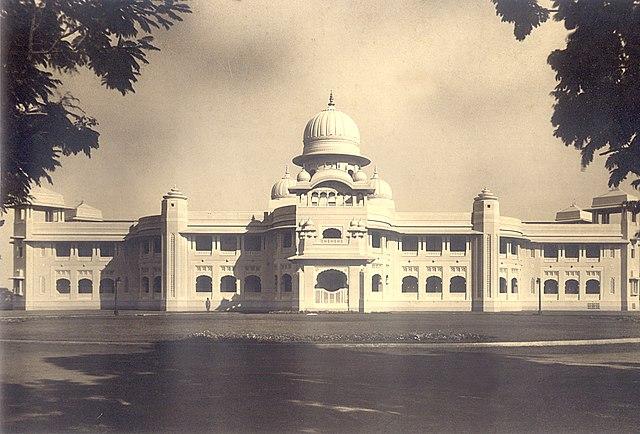
lepetitjournal.com Bombay: Prince Manvendra Singh Gohil, first of all, thank you for accepting our interview. Could you describe your childhood, the discovery of your homosexuality and the stages of your coming out?
Prince Manvendra Singh Gohil: I am the heir son of Maharaja of Rajpipla, a kingdom over 650 years old in Gujarat. As I explain in a TedX Talk at a school in Amritsar, I was born with a silver spoon in my mouth and spent my childhood in a big house in Mumbai where 22 domestics worked. I was brought up in an ultra protected environment by a "nanny" with strict rules and protocols to follow, I very rarely saw my parents. It's a very different childhood, cut off from the outside world and without social interaction.
I started to discover my homosexuality around 14-15 years old, but I did not know the words to describe my feelings. At 25, I was married to a Princess by my parents, it was a disaster and it ended in divorce a year later.
After meeting the first Indian gay activist, Ashok Row Kavi, I became aware of my sexuality. I launched into actions with the homosexual community in India which allowed me to rub shoulders with many homosexuals and to accept myself as such without however openly declaring myself to my parents. In 2000, I founded the “Lakshya Trust” association in Gujarat to do prevention and raise awareness of the risks of AIDS.
But, in 2002, I was hospitalized for depression and my psychiatrist explained to my parents that I was homosexual. It seems inconceivable to them and they confine me to the palace of Rajpipla. For them, an heir to the throne has a role model to play with the local population and he cannot be homosexual. My parents tried all kinds of techniques and methods to "cure" me in what is called conversion therapy, which is still practiced in many families. It ranges from prayer to torture ... I accepted all their attempts to change myself, I even had to go through electroshocks, it seemed to me the only way they would eventually face the facts.
Finally, in 2006, I came out by accepting an interview with a local journalist. The article caused a stir, but I was convinced I had done the right thing.
Everything has changed when I was invited to the Oprah Winfrey set as a gay prince. This interview had significant positive impact and allowed me to live fully and continue to develop my actions for the prevention of AIDS and the protection of homosexual populations in India. It changed the minds of many people towards me, especially my parents. I was finally recognized as myself!

Can you tell us more about your association and the actions you have taken?
The aim of Lakshya Trust is to prevent the risks of AIDS among men who have sex with men and to provide sick people with adequate information on treatment options and protection. India is the third country with the most AIDS patients in the world, although little is said about it. According to government figures, there are 2.5 million people living with HIV in the country, but this number is certainly largely underestimated because there is no systematic screening.
The foundation received the government's approval from its creation to act with the homosexual community while homosexuality was still considered a crime (note: homosexuality was decriminalized following the decision of the Supreme Court to repeal article 377 of the Constitution in December 2018).
One of the successes of the Lakshya Trust was the adoption by the Indian government of the HIV-positive People's Rights Act in 2017 which prohibits discrimination in the workplace and in hospitals in particular. The government is also introducing the use of rapid test methods, which now makes it possible to identify patients faster and on a larger scale. In addition, it is now possible to organize numerous screening camps in order to be able to assess the extent of the disease in the country. There are still many stigmas attached to AIDS in India, and potentially infected people are reluctant to take the test. This is why we have launched numerous campaigns to raise awareness of the risks of contamination and the possibilities of treatment.
Lakshya Trust works to promote the use of condoms which are still poorly regarded in India and which are one of the means to prevent infection with AIDS. People are reluctant to go buy condoms, which is why we have launched free condom distribution campaigns in several cities. With the help of the AIDS Healthcare Foundation, we have started an online condom donation site that is couriered, for now, only to Delhi. The goal is to make condoms available to everyone in public places as is the case in Europe or America where they can be bought from dispensers in public toilets.
Thanks to our actions, today, people with HIV have access to treatment as soon as their disease is discovered, whereas before, doctors waited until the patient was at a certain stage of the disease before they started prescribing drugs. This is a big step in limiting the spread of the virus
Lakshya Trust was founded in Gujarat and its area of intervention is in that state. However, we are in contact with other associations all over India in order to reach the entire population of the country. There is a network in India for the equality of sexual minorities in all areas of life, without discrimination: INFOSEM, of which I am a member. Through this network, we can help anyone anywhere in India.
In addition, I am the Ambassador to India of AIDS Healthcare Foundation, the world's largest and oldest AIDS testing and treatment organization.
You mentioned the INFOSEM network for equality of sexual minorities in India. The Hijras are one of those sexual minorities that is often talked about and can be seen begging on the streets of Bombay. Can you tell us more about this community that you also help?
The Hijra community lives in the countries of the Indian subcontinent: India, Pakistan, Nepal and Bangladesh and has existed for several centuries. They are different transgender people who are not part of society and live among themselves in their families according to their own social structure. They traditionally make a living from begging, but also animate entertainment at weddings (songs, dances and dramatic pieces) and often work in prostitution.
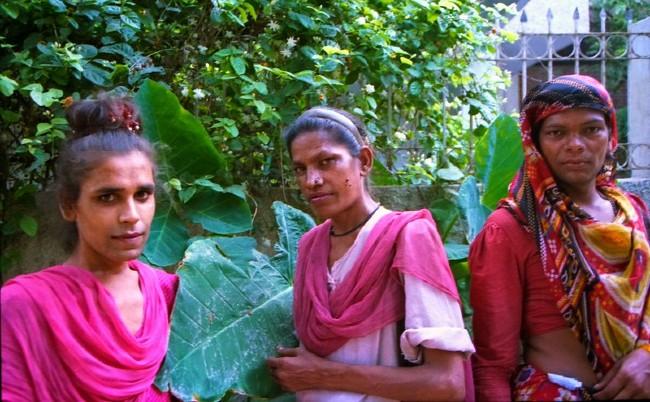
The Hijras were known to be brilliant soldiers as part of the Mughal army, and also provided security for the royal court. Before British colonization, they were highly respected and bestowed their blessings on marriages and births.
The Hijras worship the goddess Bahuchara Mata, who according to Hindu legends cut her breasts to escape rape or castrated her husband who was cheating on her with a man. The main temple of Bahuchara Mata is located in Gujarat, near Ahmedabad, Hijras from all parts of the subcontinent come to this temple to pray to Bahuchara Mata. She is also the goddess of celibacy.
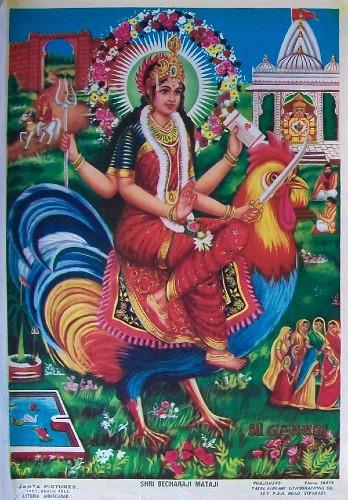
The position of the Hijras in society was profoundly changed by British colonization, with the English fearing their warlike abilities. Following the rebellion against the British Empire in 1857, Queen Victoria reportedly asked the administrators of the Indian colonies to identify populations that were against her empire and the Hijras and prostitutes were pointed out. It is to counter the power of these two communities that the settlers drafted what was article 377 of the Indian Constitution (note: abolished in December 2018 by the Supreme Court) which made the sexual act not practiced in view of reproduction a crime. This law, in fact, targeted homosexuals but also all people having a sexual relation without the objective of procreating. Like many other laws, this one was incorporated into the Indian constitution after the proclamation of independence even though, in essence, it was opposed to several other articles of the same document.
From this period, the Hijras lose their status, are discriminated against and their social condition deteriorates.
Recently, the Hijras have benefited from the protection of their rights in matters of housing, education and health as well as other members of the transgender community according to the law to protect the rights of transgender persons voted in 2019 (Transgender Persons [Protection of Rights] Bill, 2019) after several attempts since the recognition of transgender rights in 2014 by the Supreme Court. I think India is the first country in the world to recognize transgender rights. The law identifies three categories of transgender people: transwomen, transmen and Hijras. However, the current law does not fully satisfy members of the transgender community because it does not allow them to freely choose their identity as was the case in the Supreme Court judgment of 2014.
But, the Hijras are still a disadvantaged community on the fringes of contemporary society.
In 2019, two candidates from the Hijra community of Mumbai stood for election to the lower house of Indian parliament.
A message for the readers?
Regardless of our nationality, gender or place of residence, it is important to learn about things that you do not know in order to form a clear opinion. For example, in 2019, hardly anyone knew about the coronavirus, today everyone is aware of the prevention measures and the risks. The same should be done for AIDS: it’s important to educate ourselves on that subject to avoid discrimination and misinformation and to prevent the spread of the disease. This is the goal of the Lakshya Trust: to disseminate accurate and objective information about AIDS.
“Put yourself in a person's shoes and try to understand that person’s problems. This is the best way. "

Rejoignez le Club des lecteurs contributeurs
Pour être sûr de recevoir GRATUITEMENT tous les jours notre newsletter (du lundi au vendredi) (attention Bombay est tout en bas de la liste), Ou nous suivre sur Facebook.
Sur le même sujet









